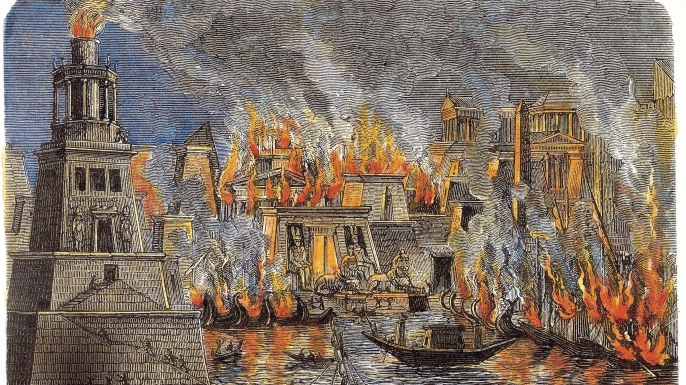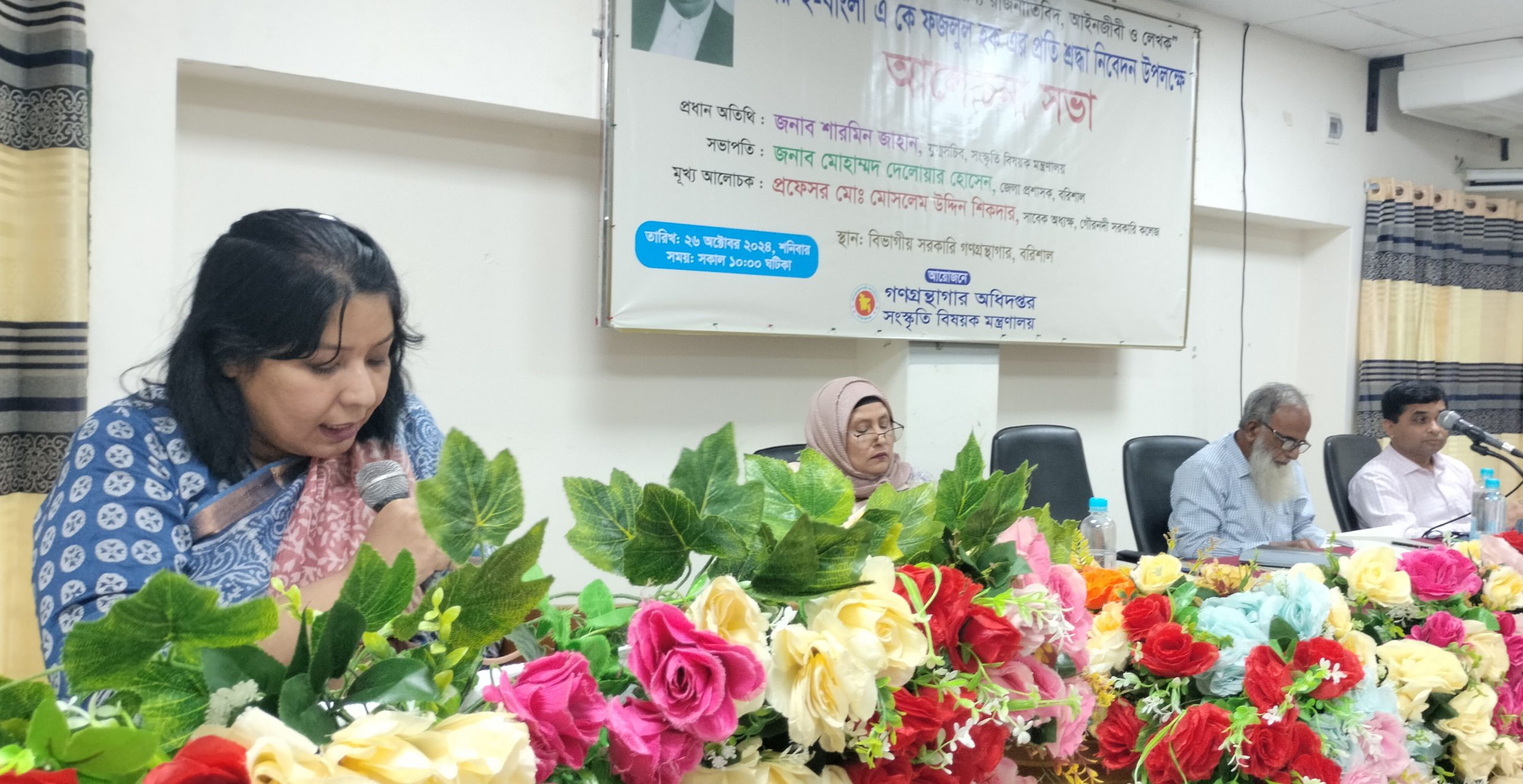মাহমুদ ইউসুফ
আলেকজান্দ্রিয়া মিশরের একটি প্রাচীন শহর। এখানে ছিলো ঐতিহাসিক আলেকজান্দ্রিয়া লাইব্রেরি। লাইব্রেরিটি ছিলো সংস্কৃতি, জ্ঞান, বিজ্ঞান ও সভ্যতার প্রতীক। বলকে (কিন্তু) আজ আর এটির অস্তিত্ব নেই। প্রায় সাড়ে ষোলোশ বছর আগেই এটি হালাক হয়ে যায় প্রতীচ্যের আগ্রাসনে। ইউরোপীয় আক্রমণে এটি বরবাদ হয়। পুড়িয়ে ফেলে এর স্ক্রোল ও বইসমূহ। ইসয়িপূর্ব ৪৮ খ্রিস্টপূর্বাব্দে জুলিয়াস সিজারের মিশর আক্রমণের সময়, ২৭০ সনে আরেলিয়ান আক্রমণের সময়, ৩৯১ সনে কপটিক পোপ থেওফিলাসের নির্দেশে আলেকজান্দ্রিয়ার গ্রন্থাগার সম্পূর্ণ ভস্মীভূত হয়। অগ্নিকান্ডে মূল গ্রন্থাগারটি ধ্বংসপ্রাপ্ত হওয়ার পর, গবেষকরা আলেকজান্দ্রিয়া শহরেরই অন্য প্রান্তে সেরাপিয়াম নামে এক মন্দিরে একটি ছোটো গ্রন্থাগার ব্যবহার করতেন। কনস্ট্যান্টিনোপলের সক্রেটিসের মতে কপটিক পোপ থেওপিলাস ৩৯১ সনে এই মন্দিরটিও ধ্বংস করে দেন। [মুক্তবিশ্বকোষ উইকিপিডিয়া] দুঃখের বিষয় হলো বিভিন্ন দেশের সেকুলারবিদরা আলেকজান্দ্রিয়ার গ্রন্থাগারে অগ্নিকান্ডের জন্য আজও উমার রা. ও আমর রা. কে দায়ী করে চলছেন। অথচ সাহাবিদের হাতে মিশর বিজয় হয় ৬৪২ সনে। এর আড়াইশ বছর পূর্বেই লাইব্রেরিটি বিলীন হয়ে যায়। তারপরও ‘উদোর পিন্ডি বুদোর ঘাড়ে’ চাপানো সেকুলারিস্টদের মজ্জাগত দোষ হয়ে দাঁড়িয়েছে। ইংরেজ ঐতিহাসিক ফিলিপ কুরি হিট্টি আলেজকান্দ্রিয়া গ্রন্থাগার ধ্বংসকাহিনি সম্পর্কে লিখেছেন, ‘একটা গল্প প্রচলিত আছে যে, আলেকজান্দ্রিয়ার লাইব্রেরির গ্রন্থরাশি দ্বারা আমর রা. দীর্ঘ ছয় মাস পর্যন্ত গোসলখানার চুলার আগুন জ্বালিয়েছিলেন। গল্পটি কাহিনি হিসেবে চমৎকার; তবে এর ঐতিহাসিক মূল্য কিছুই নাই। এই বিরাট টলেমীয় লাইব্রেরিটি খ্রিস্টপূর্ব ৪৮ অব্দে জুলিয়াস সিজার ভস্মসাৎ করেন। এখানে ‘দুহিতা লাইব্রেরি’ নামে পরে একটি লাইব্রেরি স্থাপিত হয়। তাও রোমক সম্রাট থিউডোসিয়াসের আদেশ মোতাবেক ৩৮৯ খ্রিস্টাব্ধে ধ্বংস করা হয়। সুতরাং আরবদের বিজয়কালে আলেকজান্দ্রিয়াতে কোনো উল্লেখযোগ্য লাইব্রেরি বর্তমান ছিলো না এবং সমসাময়িক কোনো লেখকই আমর বা ওমরের বিরুদ্ধে এ লাইব্রেরি ধ্বংসের অভিযোগ আনয়ন করেননি।’ [ফিলিপ কে হিট্টি: আরব জাতির ইতিকথা [তরজমা: প্রিন্সিপাল ইবরাহীম খাঁ], ইব্রাহিম খাঁ রচনাবলি ২, বাংলা একাডেমি ঢাকা, জুন ১৯৯৫, পৃ ৬৮৬] ভারতীয় রাজনীতিক ও সমাজবিজ্ঞানী মানবেন্দ্রনাথ রায় এ বিষয়ে আমাদেরকে জানান- `The Fatemites of Africa and the Omminades of Spain rivalled them in political power, material prosperity as well as in the patronage and propagation of knowledge. The library of Cairo contained over one hundred thousand volumes; whereas Cordova boasted of six times as many. This fact gives lie to another calumny which depicts the rise of Islam as an eruption of savage fanaticism, namely, the tale of the destruction of the famous library of Alexandria. One must have a pious mind or credulous disposition to believe that those who took delight in founding and supportin such noble seats of learning, would have callously get fire to the library of Alexandria; that those who command the gratitude of mankind for having saved its most precious patrimony, could have possibly begun by contributing destruction of that treasure. When dispassionate and scientific study of history dissipates legends and discredits malicious tales, the rise of Islam stands out not as a scourge but a blessing for the mankind.
While books written in the eleventh and twelvth century indignanty detail the shocking tale of the burning of the library of Alexandria, the historians Eustichius and Elmacin, both Egyptian Chrstians, who wrote soon after the Saracen conquest of their country, are significantly silent about the savage act. The former, a patriach of Alexandria, could be hardly suspected of partiality to the enemies of Christianity. An order of Khalif Omar has been usually cited as evidence of the barbarous act ascribed to his general. It would have been much easier not to record that order than to suppress any histical work composed by Christian prelates who had endless possibilities of concealing their compositon. A dilligent examination of al relevant evidence enabled Gibben to arrive at the following opinion on the matter: “The rigid sentence of Omar is repugnant to the sound and orthodox precept of the Mohammadan Casuits; the expessly Declare that the religions books of the Jews and Christiants, which areacquired by the right of war, should never be committed to the flames, and that the works ofprofane scientists, historians of poets, physicians or philosophers, may be lawfully applied to the use of the faithful.’’
[M. N. ROY, The Historical Role Of Islam, Vora & Co. Publications Ltd. 8, Round Building, Bombay 2 (India), Second Impression, March, 1938, p 74-75] Muktobuli | মুক্তবুলি Muktobuli is the most popular online blog to publish the rare news.
Muktobuli | মুক্তবুলি Muktobuli is the most popular online blog to publish the rare news.






CUM IN PUSSY TO GIRLFRIEND – http://clickfrm.com/zDva